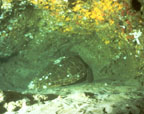|

|
As the heavier materials from
the mountains make their way through the Plateau
and Piedmont in the streams, creeks and rivers of
the click image for more... (photo: Gray's
Reef NMS)
|
|

|
The sand makes a temporary
rest in the broad deltas that form where the out
flowing fresh water collides head on with the
incoming salt at flood click image for
more...(photo: Gray's Reef NMS)
|
|

|
Planktonic (drifting) and
necktonic (swimming) invertebrates are found in the
waters above the Gray's Reef. Planktonic species
include click image for more...(photo:
Gray's Reef NMS)
|
|

|
Horizontal reef tops provide
habitat for sessile (attached) benthic (bottom
dwelling) invertebrates, which rely upon ocean
currents for food, gas exchange, waste removal, and
egg dispersal. Examples include hard corals, soft
corals, sponges, and hydroids. (photo: Karen
Angle)
|
|

|
Little sediment accumulates
on the vertical reef surface know as scarps. As a
result, the bare sandstone substrate supports
colonies of encrusting sponges and bryozoans.
Barnacles, tunicates, and sea anemones are also
found on these exposed surfaces. (photo: Karen
Angle)
|
|

|
Both predators and prey seek
good hiding places such as ledges and overhangs of
Gray's Reef like this loggerhead sea turtle
(Caretta caretta) resting under a ledge. (photo:
Gray's Reef NMS)
|
|

|
Diurnal (active at day)
species find refuge within the reef during the
night. Nocturnal (active at night) species seek to
conceal themselves click image for more...
(photo: Gray's Reef NMS)
|
|

|
Shifting sands and a lack of
firm substrate preclude most sessile forms from
settling along slopes and in sandy areas of the
reef. click image for more... (photo: Gray's
Reef NMS)
|
|

|
The invertebrates of the reef have adapted to
the different habitats found within the reef. The
ability to adapt to different, specific resources
helps to decrease competition for click
image for more... (photo: Alessandra
Score)
|





